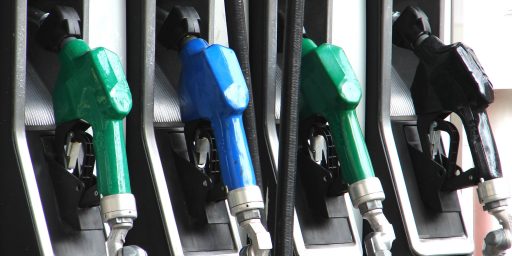The Oil Drum: The Discourse Must Change
The Oil Drum has a very good post on the current run up in oil prices. I also have now doubt it will leave many of the commenters here upset…which is one reason why I’m posting on it.
We strongly feel that the leaders of both political parties are not only headed in the wrong direction with respect to gas prices, but we also worry that they fundamentally misunderstand the factors behind the current situation at gasoline stations around the US. Public statements by political figures over the past several days would seem to suggest that oil companies and their record profits are the sole factor determining the price of gasoline. Not only is this untrue, but it is dangerous to give the American people the impression that only oil companies are to blame. The American people need to understand that the phenomenon of high gas prices cannot be attributed to a single source. They also need to understand that no one political party will be able to fix our current woes.–emphasis added
This is precisely right. For example, commenter Herb asked me who set oil prices. Herb’s view is that the price of gasoline and oil is set by the oil companies. In a trivial sense this is true. A guy at the local gas station with a suction cup on the end of a long stick does put up the numbers for the price of gasoline on the sign. However, the price is ultimately set by the market and the aggregate behavior of those in the market. If the guy with the suction cup sets the price too high he’ll not sell any gasoline; if he sets it too low he’ll run out before the tanker truck comes to refill his tanks (this is one reason why gasoline stations have prices that are either identical or close together). In fact, the market for oil is an international market and there are a whole host of actors that have an impact on the price.
Also we have to bear in mind that countries like India and China are growing and demanding more oil. If oil supply does not expand along with the increase in demand then the price will go up. An increase in the price of oil will translate into an increase in the price of gasoline. This can be seen with a very simple supply and demand analysis.
If the problems outlined at the Oil Drum are some of the main factors for the increases in prices that we are seeing, then attacking oil companies isn’t really going to solve the problem. In fact, it could make the problem worse. A per unit tax on barrels of oil sold over $40/barrel is going to translate into the oil companies selling less oil here and quite possibly resulting in a shortage. Such a tax would basically work very much like a price ceiling.
The current discourse is wrong. More discussion on how the oil markets work is needed. The idea that oil prices are determined by greedy men in boardrooms while comforting in the sense that it gives the false hope that there is an easy solution (stop the greedy men), it is misleading and dangerously so. The oil market is a global market and it is more complicated than the current discourse make it out. I grant that oil companies may indeed have market power that raises the price of oil, but this has been true for decades. Thus, whatever price increases that market power translates into has already been in prices for decades. The current problems are not simply due to price gouging.
Update: See also this article at the Reason Foundation. Also, this article by Walter Williams on the windfall tax.
Some related posts below the fold.





That was a good article.
However, reading the comment thread it became apparent that there are a lot of people who are drawn to end of the world theories and the idea of peak oil seems to be be attracting lots of them.
That is true. I agree we will run out of oil (sort of), but that it doesn’t have to be the end of the world. In fact, my belief is that it will only be the end of the world if the government gets involved to solve the problem. I say let prices rise so that it spurs research and development of alternatives.
I’m in the oil business and what is frustrating to me is the amount of wishful thinking there is with regard to energy supply.
People want cheap natural gas, oil, gasoline, and energy. But they don’t want any of the following to be done to get the cheap energy they want.
1. Any drilling off the East coast, west coast, rocky mountains, or Alaska
2. Any more coal fired plants
3. Wind farms
4. Liquid natural gas terminals
5. Any construction of new refineries
6. Any standardized national fuel blend to reduce gasoline supply bottlenecks
7. Any reduction in tariffs levied on imported ethanol.
8. Any oil imported from foreign companies.
and so on and so forth.
Given the above list I have to ask just what the *&(#$ do the complainers expect those of us that are in the oil business to do to increase energy supplies?
Wishful thinking is not going to get the job done.
The Oil Drum seems to have signed onto the ‘peak oil’ myth.
They should know better.
I don’t know bithead, I think we are going to peak in terms of our oil production. Eventually something else will be used to power civilization, at which point oil will become less and less important and production will decline. So I don’t think it is a myth. Unless of course you are talking about the doomsday scenarios some peak oil people believe in.
Steve:
I had an old mentor who told me a truth that seems to apply to “The Oil Drum” and those who are hell bent to make excuses for the oil companies.
He said:
“Figures don’t lie, but liars figure”
8.4 Billion in profit during the last quarter appears to back that up.
Herb,
Can’t you come up with something a bit better than, “They made lots of money therefore they are crooks!”?
Steve:
Obviously you did not see the meaning of the quote:
“Liars figure” means that oil companies will tell you anything and say anything, including lying, to support their high prices.
The “Oil Drum” is a pro big oil publication and they to will lie to you to support their favorite industry.
The oil companies are no different that most big corporations that will lie to you to support their positions including pricing.
Ahhh, but this assumes a lack of collusion. If a cartel of companies controls the majority, if not totality, of the supply, there is no longer any such thing as ‘too high’ or ‘too low’ – because there’s no competition to go to for a substitute brand or product.
Much of what I’ve seen from TOD in this post (haven’t had time to check the site over) seems to be discussing how the oil market ‘should’ work in a free-market sense, rather than how it ‘does’ work in a rather imperfect world economy.
Choke
Errrr what?!?!?! Are you kidding me? On what do you base this?
legion,
No disrespect, but an economics class would serve you well.
How does a cartel act when it works properly?
I’m not sure the Oil Drum is “pro big oil,” there appear to be a diverse bunch that read and post regularly.
I frequently post (though don’t really have much technical knowledge, mostly questions) and I only found them when hurricanes last year battered our coast and caused the markets to go nuts.
Following their resource links (that are mostly outside web sites, some govt, some industry, etc) I have a hard time seeing that oil production on a global scale can keep pace with consumption. And that is the root of what Peak Oil is about. Nobody is saying that one day we’ll turn the tap and go “oops, no more oil!” but plenty are saying that the people who have the oil or have the means to get the oil will start charging more and more as their livelihood starts to dry up.
Now, I have to run to the bank and sign on a gas loan.. thanks for the link and the discussion!
Steve:
Choke:
I base my comment on the many, many years of experience that you don’t have.
If, for one minute, you don’t think that big oil will not lie in order to make a profit, then you have a lot to learn as you grow older and gain the experience to see the light
No Herb, my problem is with your attribution that The Oil Drum is pro-big oil. I don’t see it that way at all. Several of the guys there are professors at universities. Their website is about peak oil and the oil industry in general. Unless you got something else to point too I just can’t accept your characterization.
Herb:
I’m one of the editors of the Oil Drum. None of the editors works for an oil company, and none of us have received any compensation for working on TOD (other than a miniscule Xmas bonus from the ad revenue). The oil industry has not supported us in any shape or form. One of our contributors is an oil industry insider, and a number of our commenters are, but very few of them use their real names because their opinions wouldn’t be popular with their employers. We are pretty much all doing this because we are genuinely concerned that oil supply is not far from peaking.
Well, I have to say, this is a first.
We are academics attempting to understand the situation and the causation behind it.
We are not “big oil,” nor are we all that friendly to oil companies. If you had read TOD before, you would know that.
Simply put, we are merely saying that singularly blaming “big oil” demonstrates a naivete of the workings of the system and that the current discourse on the issue is not productive nor constructive.
I’ll leave it at that.
Prof. Goose and Mr. Staniford,
You’ll have to forgive some of my commenters…they tend to see conspiracies whenever it comes to big oil, illegla immigration and so forth.
Thanks for stopping buy, and keep up the good work. I find your website a valuable resource.